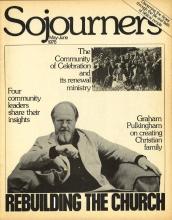There has been much talk lately about “the resurgence of evangelical social concern.” I believe that some real changes are taking place in the world of evangelical social concern, and I rejoice in it. But I also feel compelled to raise some critical questions.
I see hopeful signs, but I confess to being a bit skeptical about certain claims put forth by evangelical apologists. There isn’t much evidence yet that evangelicals have become more than mildly concerned about matters of justice.
I have no trouble believing the reports that the signing of the Chicago Declaration was a truly traumatic experience for some leaders in the evangelical movement. What had been said timidly for some years is now spoken with a directness and a bluntness which suddenly make it sound like a new message altogether! And the old question will inevitably come to the fore: for how many people do church leaders speak when they begin to speak out on matters that are considered controversial among their constituents?
The Chicago Declaration may well set the stage for a new era of evangelical social concern. But only if the signing of the document is followed by a new style of leadership. Until now, evangelical leaders, who have never made a secret of their passion for souls, have generally given the impression that any passion for social justice which existed among them was kept pretty well under control. There has been little evidence of a sense of urgency.
When issues of justice were at stake, evangelical leaders often came across more like politicians than like fiery prophets. Usually there was an admission that, yes indeed, injustices do exist; they are to be deplored, and Christians ought to help change such unfortunate conditions. The sounds of a man like Amos were scarcely heard in the evangelical social message.
Read the Full Article

